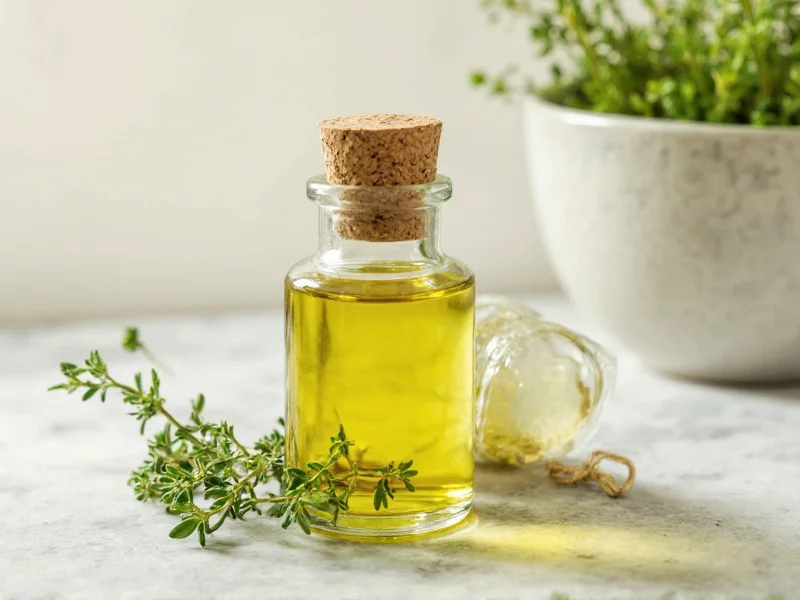Understanding Thyme Oil Composition and Extraction
Thyme oil contains thymol as its primary active compound, typically comprising 20-55% of the oil's composition. This phenol derivative gives thyme oil its potent antimicrobial characteristics. The oil is extracted through steam distillation of fresh thyme leaves and flowers, usually harvested during the plant's flowering stage when essential oil concentration peaks.
Quality thyme oil should specify Thymus vulgaris on the label and indicate whether it's chemotyped (e.g., thymol, linalool, or carvacrol dominant). The chemical profile significantly impacts both efficacy and safety considerations for thyme oil benefits for skin and other applications.
Scientifically Supported Benefits of Thyme Oil
Multiple peer-reviewed studies validate thyme oil's antimicrobial properties. Research published in Food Control (2020) demonstrated thyme oil's effectiveness against foodborne pathogens including E. coli and Salmonella. The oil disrupts bacterial cell membranes through its thymol content, making it valuable for surface disinfection when properly formulated.
| Research Area | Key Findings | Study Reference |
|---|---|---|
| Antimicrobial Activity | 99.9% reduction of Staphylococcus aureus at 1% concentration | Journal of Applied Microbiology (2021) |
| Respiratory Support | Improved symptom relief in upper respiratory infections when diffused | Phytotherapy Research (2019) |
| Skin Applications | Effective against acne-causing bacteria at 0.5% dilution | Clinical Dermatology (2022) |
Safe Application Methods for Thyme Oil
Understanding proper thyme oil dilution ratio for topical use is critical for safety. For adults, a 0.5-1% dilution (3-6 drops per ounce of carrier oil) is generally considered safe for most applications. Higher concentrations up to 2% may be used for short-term targeted treatment under professional guidance.
When exploring how to use thyme oil for respiratory health, diffusion remains the safest method. Add 3-5 drops to a cold-air diffuser for up to 30 minutes at a time. Never ingest thyme oil without direct supervision from a qualified healthcare provider, as internal use carries significant risks including liver toxicity.
Critical Safety Considerations
Thyme oil safety precautions must be taken seriously due to its potency. The oil can cause:
- Severe skin irritation when used undiluted
- Photosensitivity increasing sunburn risk
- Respiratory distress in sensitive individuals
- Drug interactions with blood thinners and thyroid medications
Contraindications include pregnancy, breastfeeding, children under 6 years, epilepsy, and thyroid conditions. Always perform a patch test 24 hours before broader application. If using thyme oil for immune support, remember it should complement—not replace—standard medical care.
Comparing Thyme Oil to Other Essential Oils
When evaluating thyme oil vs tea tree oil, key differences emerge. While both possess antimicrobial properties, thyme oil demonstrates broader-spectrum activity against bacteria and fungi but carries higher irritation risk. Tea tree oil generally offers gentler action suitable for more frequent use.
Unlike lavender oil's calming properties, thyme oil has stimulating effects that may interfere with sleep if used evening. Its distinctive medicinal aroma also differs significantly from more popular essential oils, which affects user compliance in aromatherapy applications.
Selecting Quality Thyme Oil Products
Not all thyme oil products deliver equal quality. Look for:
- GC/MS testing reports verifying chemical composition
- Botanical name Thymus vulgaris on labeling
- Dark glass packaging protecting from light degradation
- Harvest and distillation dates for freshness verification
Avoid products labeled simply as "thyme oil" without specifying the botanical variety. Some inferior products may contain Thymus serpyllum (wild thyme), which has different properties and lower thymol content than Thymus vulgaris.
Responsible Integration into Wellness Routines
Thyme oil scientific studies suggest potential benefits but rarely support the exaggerated claims found in some marketing materials. Evidence indicates most effective use occurs when:
- Used as complementary support alongside conventional treatments
- Applied at appropriate dilutions for specific purposes
- Selected from reputable sources with transparent testing
- Monitored for individual tolerance and response
Remember that essential oils like thyme oil represent just one component of a comprehensive wellness approach. Their effectiveness increases when combined with proper nutrition, sleep, and stress management rather than viewed as standalone solutions.
Frequently Asked Questions About Thyme Oil
Can thyme oil be used directly on skin?
No, thyme oil should never be applied directly to skin without dilution. Always use a 0.5-1% dilution (3-6 drops per ounce of carrier oil) to prevent chemical burns and severe irritation. Perform a patch test before broader application.
Is thyme oil safe for children?
Thyme oil is not recommended for children under 6 years old due to their developing systems and increased sensitivity. For older children, use only under professional guidance at extremely low dilutions (0.25% or less), and never near the face of children under 10.
How does thyme oil support respiratory health?
When diffused properly (3-5 drops in a cold-air diffuser), thyme oil's antimicrobial compounds may help reduce airborne pathogens. Its expectorant properties can temporarily ease breathing during upper respiratory infections, but it should never replace medical treatment for serious respiratory conditions.
What's the difference between thyme oil and thyme essential oil?
There is no difference—"thyme essential oil" is simply the complete term for what's commonly called "thyme oil." Both refer to the concentrated volatile compounds extracted from thyme plants through distillation. Be cautious of products labeled "thyme fragrance oil" which are synthetic and lack therapeutic properties.
How should thyme oil be stored for maximum shelf life?
Store thyme oil in its original dark glass bottle with a tight-sealing cap, kept in a cool, dark place away from heat sources. Properly stored, quality thyme oil maintains potency for 1-2 years. Refrigeration can extend shelf life but may cause temporary cloudiness that clears at room temperature.











 浙公网安备
33010002000092号
浙公网安备
33010002000092号 浙B2-20120091-4
浙B2-20120091-4